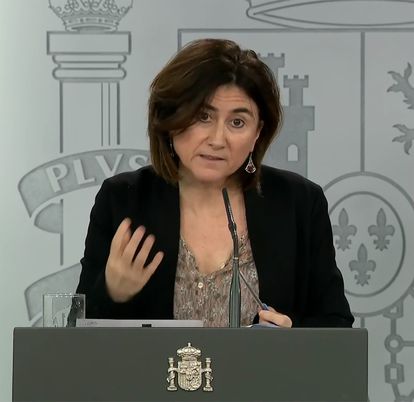Spain eases some restrictions on workers, hoping Covid-19 cases will not spike again
People who work in industry and construction will be allowed to return to their jobs on Monday after a two-week period of ‘hibernation’
/cloudfront-eu-central-1.images.arcpublishing.com/prisa/4VSA5KVNBZACDPDR7CYGBYLZQI.jpg)
This coming Monday will mark a return to regular activity for some non-essential businesses that were placed in a temporary period of “hibernation” on March 30. For companies located in regions that observe Easter Monday, the return will be pushed to Tuesday.
These include companies from the industrial and construction sectors that were forced to close for two weeks as the government ramped up existing confinement measures in a bid to contain the spread of the coronavirus.
We don’t believe that contagion is going to increaseMaría José Sierra, Coordination Center for Health Emergencies
Employees at these companies and factories, who are mostly unable to perform their jobs from home, will be allowed to go back to work. Some services that were closed on March 30, such as gestorías – companies that deal with bureaucratic paperwork and tax filings for their clients – will also reopen next week.
Meanwhile essential workers – those involved in healthcare and the food chain, among others – will continue to perform their work, as they have since the introduction of the state of alarm on March 14. So will people working from home, who were not included in the ban.
But the eased conditions do not extend to retail stores, business specializing in entertainment and leisure, or to bars and restaurants (except those offering home delivery).
No new spikes
The move brings Spain back to where it was two weeks ago in terms of economic activity. María José Sierra, the spokesperson for Spain’s Health Emergency Coordination Center, said the government is not expecting to see a new spike in Covid-19 cases as a result.

“If a person detects any symptoms, it is important for them to stay home or at work and to self-isolate, and to contact the health system. We don’t believe that contagion is going to increase,” said Sierra at a news conference on Friday. The decision was taken without full consensus among members of the government’s committee of experts, some of whom favor extending the economic hibernation for a longer period.
Antoni Trilla, an epidemiologist who sits on the committee, said that in his opinion, “it would be the sensible thing” to extend the hibernation longer.
On Saturday, health authorities announced an overnight death toll of 510 people, the lowest daily figure since March 23. Spain has been under lockdown since March 14, when authorities decreed a state of alarm that officially ends on April 26 but could be extended further.
English version by Susana Urra.
/cloudfront-eu-central-1.images.arcpublishing.com/prisa/GV4UBCPMV6U23QTBAKMF5ICNWU.jpg)
/cloudfront-eu-central-1.images.arcpublishing.com/prisa/FGUQ63KO4RAAXAJOUMMOA36BKM.jpg)










































